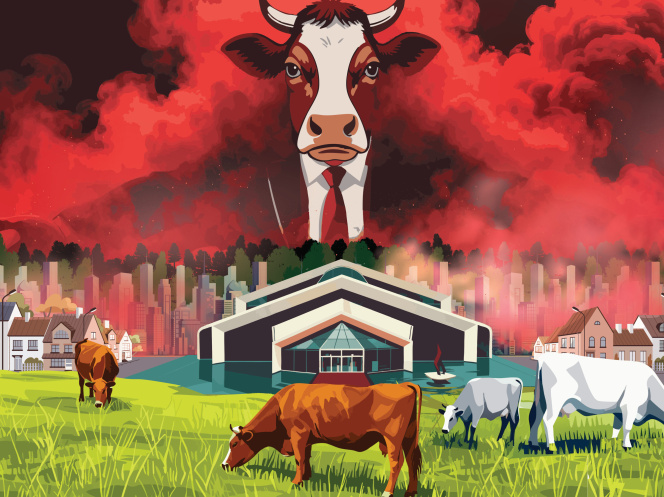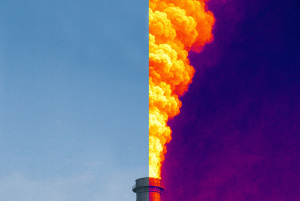The Meat Agenda: Agricultural Exceptionalism and Greenwash in Brazil

Executive Summary
As Brazil prepares to host the 30th conference of the parties of UNFCCC (COP30) in heart of the Amazon, the country is positioning itself as a global climate leader with ambitious emissions reduction targets of 59-67% by 2035. Under President Lula, there have been laudable achievements: deforestation fell to the lowest rate in nearly a decade in 2024, significant progress after the acceleration under President Bolsonaro, and the government has made meaningful advances in hunger reduction.
Brazil has made ‘transforming agriculture and food systems’ the third axis on the COP conference agenda, after transforming energy, industry and transport and safeguarding forests and biodiversity. According to a letter by COP30 President André Aranha Correa do Lago these axes and corresponding action points highlight ‘super-leverage points’ where accelerated implementation, enhanced cooperation, and targeted support can drive systemic transformation and include areas, where Brazil’s experience can contribute with concrete solutions. While this sounds promising, there is a risk that Brazil’s powerful agribusiness sector, which is trying to position itself as part of the climate solution, will set the agenda.
Brazil is the world’s fifth-largest emitter of greenhouse gases, and the fifth-largest emitter of methane, a potent greenhouse gas that warms the atmosphere 80-times more than carbon dioxide over a 20-year period. Agriculture accounts for 75.6% of Brazil’s methane emissions, and 74% of its total emissions, with enteric fermentation (cow burps) producing 405 million tonnes of carbon dioxide equivalent (CO₂e) in 2023, more than Italy’s entire economy (in CO₂e). Methane emissions increased by 6% between 2020 and 2023, with 97% originating from beef and dairy cattle. The scale of Brazil’s livestock sector is staggering: the country has more cattle (238.6 million) than people (213.4 million) and is the world’s largest beef exporter.
Agriculture is Brazil’s largest climate polluter, yet the sector continues to be shielded from meaningful regulation through systematic greenwashing, effective lobbying and political capture by vested interests. This influence is so entrenched that despite Brazil being a signatory to the Global Methane Pledge, agricultural methane receives no mention in the country’s nationally determined contribution (NDC) – a glaring omission.
In this report, Changing Markets Foundation:
- Exposes the scale of corporate capture, bringing together for the first time the coordinated calendar of industry-led events attempting to shape the narrative on agriculture around COP30.
- Shines a spotlight on the agricultural methane blind spot — an omission from Brazil’s NDC that shields the country’s biggest methane polluters from scrutiny.
- Unpacks how key climate policies are being weakened, from enforcement of the Forest Code to an Emissions Trading System that exempts agriculture altogether.
Brazil’s agribusiness sector has long branded itself as championing ‘environmental stewardship’ – narratives often reported uncritically in national media. Multimillion-dollar marketing campaigns portray agribusiness as Brazil’s economic engine, as a global food provider, and as a modern, inclusive sector that is central to national identity.
The reality is a far cry from the rhetoric: the industry is responsible for a range of well-documented crimes – from deforestation to exploitative practices, land grabbing, and pollution – which permeate the supply chains of global meat giants like JBS, Marfrig, and Minerva. The industry is also largely focused on producing export-oriented commodities, while over two-thirds of the food consumed domestically is produced by Brazil’s small farmers, who control just a quarter of the country’s farmland and receive less than a fifth of public credit.
Greenwashing and marketing campaigns are backed up by the powerful ruralist caucus, which controls most of Congress, and enables agribusiness to maintain a privileged position of lenient regulation and enormous tax breaks. The sector’s power was laid bare in the so-called ‘Destruction Bill’ passed in July 2025 – a rollback of environmental protections that, despite several vetoes from President Lula, still gave serious concessions to agribusiness in how it planned to ‘cut red tape’.
The Road to Belém: Paved with Greenwash
In recent years, the presence of corporate lobbyists has become a regular feature of COPs including representatives from JBS, Marfrig and Minerva as part of national delegations or hosting closed-door meetings. As Brazil is hosting COP30, its agribusiness sector is seizing the opportunity to capitalise on its political access, putting in efforts to control the narrative and shape the agenda around climate, food and agriculture. Brazil’s special envoy for agriculture, Roberto Rodrigues, promises that COP30 will showcase “the efficiency and replicability of Brazilian tropical agribusiness” to the world.
These efforts will culminate in the AgriZone, part of the official COP30 agenda, which will host around 400 events, many led by industry, and is being promoted as a platform to address environmental challenges while showcasing the successes of Brazilian agriculture.
From forums presenting Brazilian agribusiness as an ‘environmental powerhouse’ to journalist workshops promoting ‘fair metrics’ for ‘tropical agriculture’, corporations have orchestrated a sophisticated campaign to position themselves as part of the climate solution. In addition to industry and political dialogue, the road to Belém has seen corporate influence over political events and media coverage, including industry-hosted journalist workshops and sponsored reporting. This report compiles a non-exhaustive list of events driven or influenced by meat corporations.
The efforts will continue throughout COP30, notably from JBS, which has been co-sponsoring COP30 coverage throughout the year with major Brazilian outlets O Globo, Valor Econômico and is a co-sponsor of the Folha media centre, to be held just 450 metres from the conference centre. The company is also preparing to launch a study at COP30 in collaboration with the University of Kansas to challenge current methodologies for calculating greenhouse gas emissions from livestock production, part of an industry backed campaign to downplay its methane pollution.[xvi] Meanwhile, MBRF has been sowing the seeds for its renewed greenwash with its planned announcements around ‘low-carbon beef’
Brazil’s Climate Plan: Structural weaknesses favour industrial agriculture
The trajectory of corporate influence seen in the lead-up to COP30 builds on the long-standing foundation of agribusiness greenwash and lobbying in Brazil. The impact of this is particularly stark when considering Brazil’s updated NDC submitted in November 2024. As COP30 president, Brazil’s own NDC and its stance on agribusiness-related issues will significantly influence the overall ambition of the conference.
Not only does the plan have critical omissions, such as ignoring agricultural methane, our analysis reveals that some of the policies included to enable emissions reductions from agriculture are critically flawed and that the powerful agribusiness lobby is trying to weaken some further.
A cornerstone of Brazil’s NDC is its Climate Plan which has become a battleground in which rural caucus claims it ‘punishes those who already produce responsibly’. Other policies in the NDC also enabling weak regulation of or special treatment for agribusiness, which include:
- The Tax Reform consolidates fiscal privileges for pesticides and animal protein, rewarding high-emission systems rather than penalising them.
- The ABC+ Plan, a key policy for financing sustainable agriculture is widely touted by industry to burnish its sustainability claims. While the plan does set ambitious environmental targets, it has historically been ineffective with studies showing 75% of degraded areas in key land reclamation projects remain unchanged four years after funding.
- The Brazilian Emissions Trading System only regulates only about 30% of national emissions because agricultural emissions were excluded after the sector argued that reliable methods to measure its emissions do not exist. However, meat companies actively work to get emissions credits through non-regulated, voluntary carbon markets. This contradiction highlights that methods for measuring agricultural emissions clearly exist but are being sidelined to protect industry interests, undermining the effectiveness of Brazil’s NDC.
- The Forest Code and Rural Environmental Registry (CAR) are central to Brazil’s NDC for land-use regulation and forest protection but face serious enforcement challenges. The CAR has been weakened by agribusiness influence and poor oversight, allowing millions of hectares of forest to be illegally registered or erased from records. Despite recognising the need to strengthen compliance, Brazil’s NDC overlooks the persistent governance failures, political resistance, and delays that continue to undermine effective forest protection.
Agribusiness lobbyists are seeking to further undermine Brazil’s climate commitments by pushing emissions calculations based on ‘no additional warming’, such as adopting GWP* metric, a move which would allow the country to claim climate neutrality or even cooling by investing in small methane emissions reductions while maintaining its vast livestock sector. This effort is part of a global industry campaign, supported by pro-industry scientists, to change the way methane is measured with the aim to protect their large livestock industries, despite the Intergovernmental Panel on Climate Change (IPCC) explicitly rejecting GWP* for national climate accounting, stating that it ‘does not capture the contribution to warming that each methane emission makes’.
The path forward
Last year was the hottest ever recorded, with temperatures temporarily surpassing the 1.5°C threshold for the first time. Research shows that even if fossil fuel emissions were eliminated immediately, food system emissions alone would prevent meeting Paris Agreement trajectory of 1.5-degree temperature increase. Already, 28% of Brazil’s farmland lies beyond optimal climatic conditions, expected to rise to 74% by 2060—a threat to the agricultural sector’s own future.
Brazil also has active grassroots movements, with Indigenous leaders and civil society groups challenging industry narratives and defending forests and climate. Threats to forests and livelihoods in the Bolsonaro era, have resulted in an increased mobilisation and renewed hope in Lula’s government, when it comes to championing the climate agenda. Lula’s government also has some remarkable recent successes in its pocket: it has made progress toward eradicating hunger through its renewed focus on supporting climate resilient agroecological farming that actually feeds Brazil’s population and slow soaring deforestation rates.
As world leaders gather in Belém, Brazil can choose which face it wants to show to the world: the one in which communities, climate and health are at the centre of the agenda, or vested interests that promote status quo with a green mask. COP30 is a critical opportunity to ensure that when it comes to food systems, climate science rather than corporate influence, shapes our path forward.
You might also like...

Methane Unmasked
To investigate and visualise the issue of leakages further, Changing Markets Foundation and Deutsche Umwelthilfe (DUH) inspected two biogas plants in Denmark, which both have connections to the country’s big...

Methane Matters: A comprehensive approach to methane mitigation
In November 2021, more than 110 countries committed to the ‘Global Methane Pledge’, with the collective goal of reducing global methane emissions by 30% by 2030. This report looks across the three main secto...

Feeding Us Greenwash: An analysis of misleading claims in the food sector
This report exposes the rampant greenwashing by the food industry and explores how consumers respond to green claims made by companies.